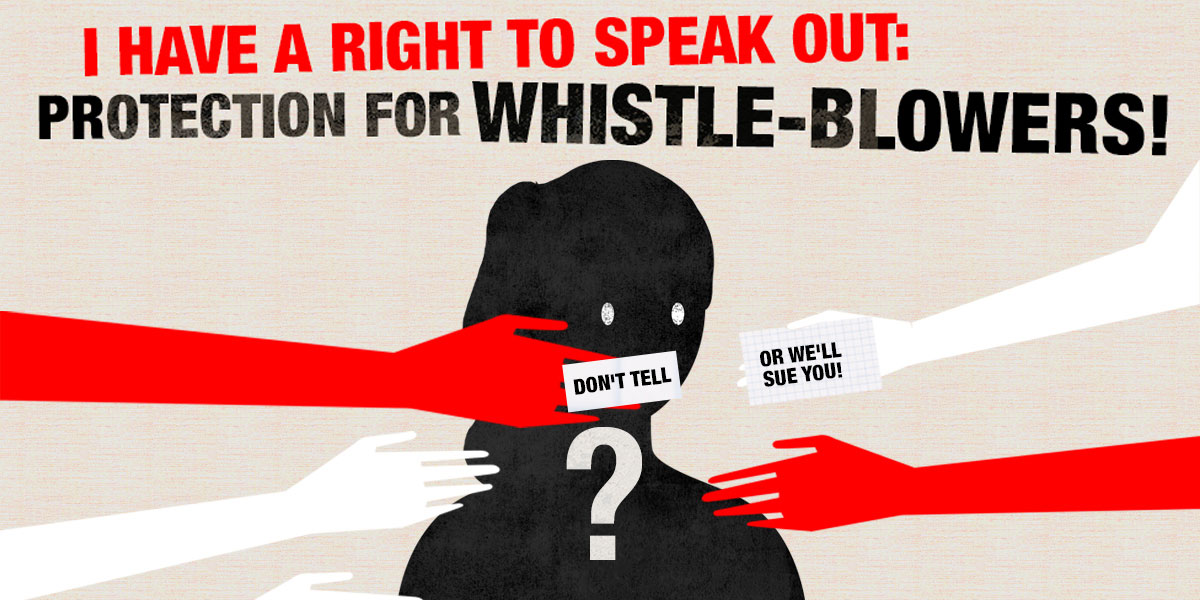Americans who get labeled a “whistleblower” become a hero. Get labeled a “leaker” and you could get branded a traitor and end up in jail. What’s the difference? It all depends on the status of information shared and the channels that the information travels through to become public.
Whistleblower Protections: In essence, a whistleblower is a leaker of information that certain parties would have preferred to remain secret. To encourage people to come forward with information out of concern for public safety, there are U.S. statutes that protect whistleblowers. However, there is a fine line between being a protected whistleblower or a criminal leaker.
Status Of Information: Any American citizen can disclose corporate or government information so long as it is not federally classified information or disclosures prohibited by the Uniform Trade Secrets Act.
- Trade Secrets: A patented product or process is one tangible example of a trade secret. Patent information is protected for 17 years. But companies and individuals enjoy protection of certain trade related information other than what is covered by a patent. However a trade secret is specifically defined, it enjoys legal protection.
- Federal Information: There are generally three categories of federally classified material: sensitive, secret and confidential. Category is determined by who might be harmed if the information went public. However, material must be de-classified after it ages past the 25-year mark unless it meets a narrow exemption, such as designs for nuclear weapons.
Lifting The Veil: But what if it is in the best interest of the public that legally protected secrets be revealed? The difference between a whistleblower and a leaker is defined in the key decision on how to go about lifting the veil. To enjoy legal protection, a whistleblower must go through proper channels to bring the information to light. A leaker goes straight to the public. A whistleblower is legally protected from prosecution via the Whistleblower Protection Enhancement Act of 2012. A leaker doesn’t have the same protection. That is why leakers often exercise their freedom of speech in ways that protect their anonymity.
Information might be leaked anonymously to a news agency or journalist. Leaking directly to the public through the Internet is also popular. Platforms like OrangeWebsite are committed to supporting freedom of speech and make it easy to go public in a global forum.
Why Go Rogue? If there are legal protections in place that allow a concerned citizen to bring important information to the public’s attention, why risk legal trouble by becoming a leaker? There are usually three different circumstances that inspire a person to go rogue with classified information or trade secrets.
1. Frustration: A person trying to serve public interest by first going through the proper channels may become frustrated if they experience stonewalling. The wheels of bureaucracy oftentimes churn quite slowly. A concerned citizen may have had every intention of being a protected whistleblower. They had a reasonable expectation of believing in “the system”. They wanted to put an end to improper corporate practices, abuse of authority or other circumstances they felt endangered the public or violated public trust. However, should they become anxious, awaiting results from their appropriate action of bringing attention to the matter within the proper channels, they might decide to go rogue. Especially if they believe that lives are at stake.
2. Money: Where trade secrets or military intelligence is concerned, the pay-out of a lifetime could become an irresistible temptation even for the most scrupulous concerned citizen. Enemies of the state and eagerly competitive entrepreneurs understand the value of such information. They are willing to pay to get their hands on what will surely be the information that will make their careers. The average citizen is no match for highly skilled negotiators tasked with securing sensitive information.
3. Political Motives: Although it is easy to ascribe political motives to many leaks that reveal embarrassing or compromising information about politicians, political motives can run much deeper. Sometimes there is real villainy attached to political motives behind a leak of classified information and trade secrets. Traditional politics can inspire a person to leak information that can endanger military and intelligence personnel. For countries engaged in wars, within the populace of their own country are those willing to do anything to resist and interfere in military action. But the definition of politics is more nuanced. Even a corporate environment has its own politics. A leaker of a trade secret could simply be a disgruntled employee seeking to sabotage an employer as a form of retribution.
Where The Government Stands: Although it may seem that the U.S. government is always up to something nefarious, the truth is that agencies strenuously encourage blowing the whistle on misconduct or wrongful acts. There are hotlines provided, such as the Office of Inspector Generals (OIG). Presidential directives prohibit employer retaliation toward a whistleblower. The U.S. Occupational Safety and Health Administration (OSHA) has a whistleblower website. The Office of Special Counsel (OSC) is tasked with investigating and prosecuting allegations received from whistleblowers. By making it easy to communicate to federal officials about concerns, the government is signalling to concerned citizens that the State does, indeed, care about doing the right thing. But a whistleblower must be patient, understanding that the investigative process is tedious, lengthy and, by its very nature, quiet. It may seem like nothing is happening when the exact opposite is true.
The Risk Of Going Rogue: Should a whistleblower throw their hands up in the air, grow impatient and cross the line to become a leaker, they put themselves at risk for prosecution. Should a case be made against them, their motive will be the hinge upon which their case will turn. Even if a motive is concern for the public, but a whistleblower became impatient with the process, the mood of the country could still result in the full weight of the law coming down. In a national climate that is strained by war, hostile politics, and a number of public actors who became notorious leakers escaping justice, it could be that the federal government seeks to make an example of a leaker and any leaker will do. Even a leaker with noble intentions.
For more information on issues related to freedom of speech, security and online privacy, please contact us. That is our mission, to provide the world with a platform for the words they wish to share with the world.


Recent Comments